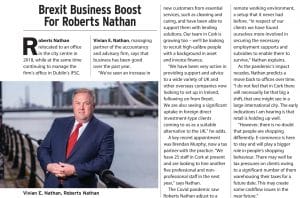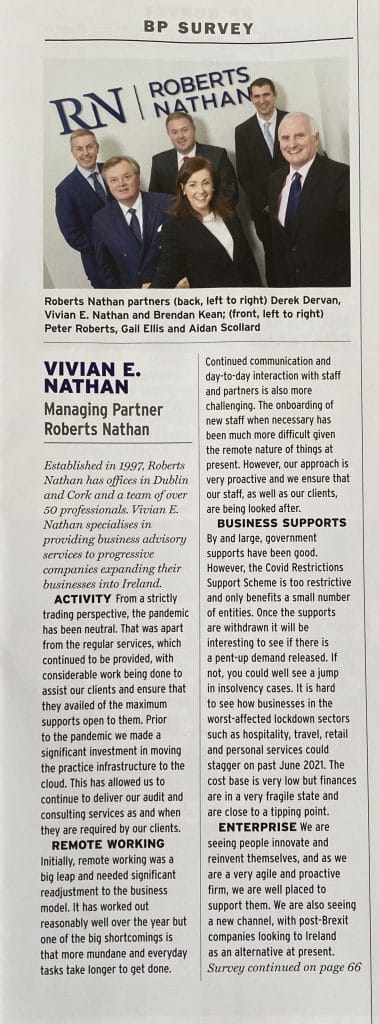News Business in Ireland
Business
Budget 2023 – What does it mean for your Business?
Paschal Donohoe and Michael McGrath have delivered Budget 2023 which the Minister for Finance specifically referred to as a “cost of living” Budget. The Minister referred to the difficult balancing act faced by the Government to help ease the burden of the rising costs of living on the public while also not driving up inflation which is currently at 8.5%.
In this regard, the measures introduced were weighted strongly towards individuals’ financial position rather than towards businesses and corporates. Some of the main changes introduced to help for individuals include:
- Each PAYE worker/sole trader in the higher tax band will see tax savings in 2023 of over €800 over the course of the year with the following measures:
- increase of the standard rate band to €40,000,
- increase of personal, employee and earned income tax credits by €75 each, and
- increase in the 2% USC rate threshold by €1,625.
- A tax credit for those who are renting of €500 per annum including for the year 2022.
- Electricity credits of €600 of which €200 will be paid in December 2022 with the remainder early in the new year.
- There were a number of increases for social welfare recipients including:
- Social welfare payments to be increased by €12 per week;
- One off double week payment to social welfare recipients in October in addition to the Christmas bonus in December;
- One off payment of €200 for those in receipt of the Living Alone Allowance;
- One off payment of €500 to those on Disabililty Allowance, Invalidity Pension and Blind Pension;
- One off payment of €500 to those on Carer’s Support Grant.
- Parents will benefit greatly in this budget with the following items being introduced
- A 25% weekly reduction for those availing of the National Childcare Scheme
- A once off double payment of child benefit to all qualifying households
- Free school books to be provided for primary school children.
September 27, 2022
Business Advice
Are You Thinking Of Selling Your Business?
As the owner manager of a business, which you have spent a lifetime building, the thought of selling it is a very daunting prospect. It is critically important that you get the best possible price for it and that it will ideally continue to trade into the future under control and directorship of new owners.
A number of key steps need to be taken in order to sell your business, including:
- Valuation of the business.
- How to structure any potential sales deal.
- The best way to advertise the business and which potential buyers should be prioritised as possible purchasers.
- The best time to sell.
- The formality of due diligence and legal matters involved.
- Executive Summary
- Background to the Company
- The products or services offered together with an outline of the business model in operation
- Details of the customers and market in which the company participates
- Future opportunities attached to the business going forward
- Key financial information and financial forecast, reasonably reflecting how the company is expecting to perform in the next one to three years.
June 21, 2022
Business Advice
Have you Planned out your Payments for the Debt Warehousing Scheme?
During the pandemic, the Government introduced a number of measures to help companies and individuals who were facing cashflow difficulties. One of the helpful and widely used measures introduced was the debt warehousing regime whereby companies and individuals could warehouse their VAT, PAYE and Income Tax liabilities that occurred before 31 December 2021.
The main points of the debt warehousing scheme were as follows;
- The scheme allowed for the deferral of unpaid VAT and PAYE debts for businesses restricted from trading due to the Covid-19 pandemic for a period of 12 months after a business resumes trading.
- The debt warehousing scheme also applied to Income Tax. This allowed for the warehousing of the Income Tax liability falling due on 31 October 2021 which comprised of the balancing payment due for the 2020 Income Tax year and Preliminary Tax due for 2021 Income Tax year.
- The debt warehousing scheme was also expanded to include the recovery of any overpayment of the TWSS and EWSS which was paid to employers during the pandemic.
May 24, 2022
Business Advice
Dealing with Inflation: Advice for Business Owners
Current inflation factors
The Irish economy is going through an unprecedented period of inflation. This was initially driven by supply chain hangovers from COVID 19, which saw prices of building materials, materials for cars and increased costs of consumer goods. Since the start of 2022 there has been further inflationary pressure mainly as a result of the Russia/Ukraine conflict. This has resulted in a dramatic increase in energy costs and food product costs. Annual inflation in Ireland neared an almost 40-year high of 6.7% in March, a jump from 5.6% a month earlier. Diesel and petrol have increased by 46% and 35% respectively year-on-year while food prices rose by 3.1%. Electricity prices were up 22.4% while gas prices rose 28%.Outlook
The Central Bank predicts that price growth will peak at 7.7% in the second quarter of 2022 before retreating to 5.1% towards the end of the year. SME’s have endured a turbulent few years as a result of COVID 19 and are still dealing with legacy issues as a result of the pandemic. There is now an additional headache as they navigate inflationary increases.What companies need to consider
- How to deal with any Revenue warehoused debt
- A significant amount of SME’s took advantage of the Revenue debt warehousing scheme. The interest free period comes to an end on the 31 December 2022 and companies will need to engage with Revenue and agree as to how they intend to deal with these liabilities.
- As a result of inflationary pressures margins for businesses are likely to come under pressure due to:
- Higher raw material costs
- Higher energy costs
- Upward pressure on employee wage costs as staff deal with a higher cost of living
Steps companies need to take now
- Preparation of reliable management information will be crucial to help companies deal with the current headwinds. This information should include:
- Up to date Management Accounts
- Cashflow and Budgets which reflect accurately any cost increases and are reasonable in terms of increases in turnover.
- Engage with Revenue and agree how warehoused taxes are to be dealt with.
- In a high inflation economy, it is important to engage with suppliers and lock in prices as early as possible.
- Engage with customers / clients early and flag increased prices. Any lag in passing on price increases will affect margins and profitability.
How Roberts Nathan can help
We have been assisting many of our clients recently with their plans to navigate through this challenging time with the preparation of the above-mentioned Management Accounts and Budgets. If you are concerned about these current challenges and would like to consider availing of these services we would be delighted to assist you. If you would like to discuss the above you can contact Brendan or email us at info@robertsnathan.com Contact Us
May 11, 2022
Business Advice
Bidding On The Right Contracts
- Profitability
- Potential
- Long-term planning
How can we help?
From comprehensive business advisory to making bids, we provide you with the assistance for each of these business aspects. When you choose us for your bidding solutions, we'll simplify the process and show you how to create winning bids that will incur the highest profits for your business. In addition, we'll assist you with identifying allocation bases and dividing pools of expenses, compiling indirect costs, and calculating fair and attractive rates for contract proposals. By working with the Roberts Nathan team, you can rest assured that all your contract bids will be made after comprehensive, thorough analysis of your resources which will guarantee to deliver your business the best possible returns. Please reach out to me on shane.meade@robertsnathan.com or feel free to give me a call on +353 (021) 494 3977 if you have any questions in relation to any part of the contract bidding process.
July 7, 2021
Business
Roberts Nathan featured in the Business Plus July edition
Our Managing Partner Vivian Nathan speaking to the Business Plus July 2021 edition. Vivian shares his views on how Brexit has been a boost for Roberts Nathan.


July 5, 2021
Business in Ireland
Setting Up a Company in Ireland F.A.Q’s
What are the basics I need to know?
Before they became clients of ours, many business owners had the following questions they needed answers to when considering setting up a company in Ireland. As a result, we have decided to answer the most frequently asked questions we regularly receive.
- What do I need to consider when registering for a VAT number in Ireland?
- Is it possible to set up a business bank account as a non-resident and what’s required?
- How long does it take to register a limited company?
- What are those documents?
- A copy of your passport
- Proof of address
- What paperwork is required to be filed annually for this company?
- Are the company directors required to be residents in Ireland?
- Do I need a company secretary?
- How do I get a postal address in Ireland, do I really need it?
- How much does this all cost?
May 13, 2021
Uncategorized
Covid Restriction Support Scheme
As many businesses begin reopening their doors this week, the Revenue have confirmed those eligible for the Covid Restriction Support Scheme should be able to avail of two weeks double payment of the scheme in order to assist with restarting their businesses. See details of the Revenue press release here.
As Revenue have reiterated in recent times, all reliefs such as the CRSS require up to date tax clearance certificates which mean the taxpayer must have all tax returns filed and payments made or debt arrangements agreed.
At Roberts Nathan we continue to assist our clients both applying for and maintaining Covid reliefs. Feel free to contact us if you wish to discuss any Covid supports or any issues arising for your business as the economy reopens over the coming weeks.
May 12, 2021
Business
Roberts Nathan featured in the Business Plus March edition
Our Managing Partner Vivian Nathan speaking to the Business Plus March 2021 edition. Vivian shares his views on activity levels, remote working, business supports and enterprise.


March 10, 2021
Brexit
UK Budget
On Wednesday Rishi Sunak announced the UK budget and Irish interest was immediately drawn to the confirmation that the Corporation Tax rate would increase from 19% to 25% from April 2023 for companies with profits of at least £250k. This can only be seen as a positive for Ireland where our continued commitment to the 12.5% Corporation Tax rate would make it an ideal location from UK businesses looking to relocate operations to the EU. Ireland’s Corporation Tax code is built on transparency and substance and we have advised many businesses on the requirements to establishing in Ireland from a direct tax, indirect tax and commercial perspective.
March 5, 2021
